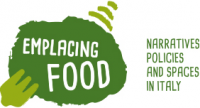EMPLACING FOOD
Narratives, policies and spaces in Italy. Rethinking the territorial dimensions of food, in the challenges of justice, sustainability, cultural identity and local development

Classificazione:
nazionali
Programma:
PRIN 2020
Call / Bando:
PRIN - Progetti di ricerca di rilevante interesse nazionale – Bando 2020
Settore ERC:
Social Sciences and Humanities
Ruolo Unict:
Partner
Durata del progetto in mesi:
36
Data inizio:
Mercoledì, 1 Giugno 2022
Data fine:
Domenica, 1 Giugno 2025
Costo totale:
€ 620.955,00
Quota Unict:
€ 98.790,00
Coordinatore:
Università degli Studi di Torino
Responsabile/i per Unict:
Donatella Stefania Privitera
Dipartimenti e strutture coinvolte:
Dipartimento di Scienze della Formazione
Altri partner:
- Università di Torino
- Università di Milano-Bicocca
- Università di Pisa
- Università del Salento
Abstract
This project has the general objective to develop a critical rethinking of food-space relationships, paying particular attention to the role of urban and local scales, in order to eventually provide a critical and operational contribution to the making of new food policies targeted at a wide range of food system dimensions, such as: food security, food access, democracy and food justice; food-health nexus; environmental impact and climate change; production-consumption relationships, landscape management, land consumption, and foodscapes; technological innovation in food chains; food waste; and food-related identities and cultural and social values.
The EMPLACING FOOD project departs from the following interdependent points:
- The lack of integrated food policies in the Italian context may be related to dominant narratives about food systems and their territorial dimensions, which bring to political agendas and policy tools that do not address more urgent issues.
- At the same time, there are other - so-called resistant - narratives produced and circulated by food movements (e.g. Slow Food), and other actors, which bring forward a more “critical” vision of food, of its qualities and connection with places.
- The afore mentioned problems affecting food systems are rarely tackled from an integrated perspective. Generally, in fact, urban and territorial agendas are implemented through sectoral policy silos, which do not recognize the complex interconnections between the various dimensions of food (economic, social, environmental, cultural, health-related, etc.), the different stages of the supply chain, the places of production and consumption, the stakeholders involved, etc. Drawing from the afore mentioned points, in the initial phase the project will analyze the relationship between food and space through an interdisciplinary approach, which integrates geographical, anthropological, economic and legal perspectives. The overall theoretical framework developed will move along three strictly interconnected axes:
- symbolic, namely, the (dominant and resistant) narratives mobilised around the relationships between food and space, and highlighting their descriptive, prescriptive and performative nature;
- regulatory/organisational, namely, the regulation of food and food systems, their governance and their relationship with the territorial organization, through policies and legal tools; - material, namely, the territorial transformations related to economic, social and environmental processes connected to food systems.